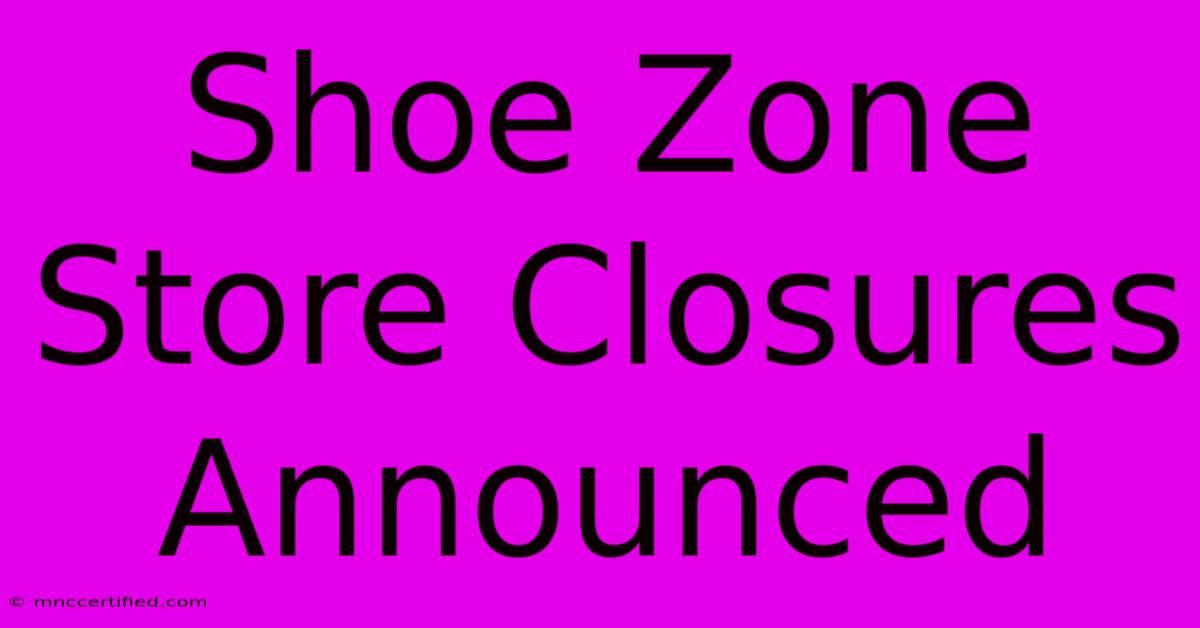Shoe Zone Store Closures Announced

Table of Contents
Shoe Zone Store Closures Announced: What We Know
The budget footwear retailer, Shoe Zone, has recently announced a series of store closures. This news has sent ripples through the retail sector and left many wondering about the future of the popular high-street brand. This article will delve into the details surrounding these closures, exploring the reasons behind them and their potential impact on both employees and customers.
Why are Shoe Zone Stores Closing?
Several factors contribute to Shoe Zone's decision to close some of its stores. While the company hasn't explicitly outlined a single cause, a combination of challenges likely played a significant role:
-
Rising Costs: Inflationary pressures, particularly increased energy costs and supply chain disruptions, have significantly impacted businesses across all sectors. Shoe Zone, like many retailers, is facing higher operational expenses, making it challenging to maintain profitability in all locations.
-
Changing Consumer Habits: The shift towards online shopping continues to pose a threat to brick-and-mortar retailers. Consumers are increasingly opting for the convenience of online purchases, potentially impacting footfall in physical stores.
-
Economic Downturn: The current economic climate, marked by a cost-of-living crisis, has led to reduced consumer spending. Customers are becoming more price-conscious, potentially impacting sales across the retail sector, including budget retailers like Shoe Zone.
-
Lease Renewals: Negotiating favorable lease renewals in a challenging market can prove difficult. High rental costs in less profitable locations may have influenced the decision to close certain stores.
-
Store Performance: Shoe Zone likely conducted a comprehensive review of its store portfolio, analyzing individual store performance and identifying underperforming locations ripe for closure.
Which Shoe Zone Stores are Closing?
Unfortunately, Shoe Zone hasn't released a comprehensive list of all affected stores. The company's announcements have been more generalized, often focusing on regional closures or referencing specific numbers of stores closing without naming individual locations. To find out if your local Shoe Zone is affected, it's best to:
-
Check the Shoe Zone Website: The official Shoe Zone website is the most reliable source of information. Look for press releases or updates regarding store closures.
-
Contact Customer Service: Reach out to Shoe Zone's customer service department directly. They may be able to confirm the status of your local store.
-
Visit the Store Directly: If you're unsure, visit your local Shoe Zone store to check for closure announcements.
What Does This Mean for Shoe Zone Employees?
The closure of any store inevitably leads to job losses. Shoe Zone's announcements have understandably raised concerns among employees. The company's approach to redundancy and support for affected employees will be a key factor in mitigating the impact of these closures. It's crucial for affected employees to seek advice and support from relevant employment agencies and unions.
The Future of Shoe Zone
While these store closures represent a significant challenge, Shoe Zone remains committed to its online presence and its remaining physical stores. The company will likely refocus its resources on optimizing its more profitable locations and strengthening its online platform. Adapting to the changing retail landscape through digital innovation and efficient cost management will be vital to Shoe Zone's continued success.
SEO Keywords Used:
- Shoe Zone store closures
- Shoe Zone closing down
- Shoe Zone store closure list
- Shoe Zone going out of business
- Shoe Zone future
- Shoe Zone redundancies
- Budget footwear retailer
- High street retailer closures
- Retail industry challenges
- Economic downturn impact on retail
This article aims to provide a comprehensive overview of the recent Shoe Zone store closures. Remember to check official sources for the most up-to-date information. By focusing on providing accurate and informative content, this piece aims to rank highly in search engine results for relevant keywords. Further off-page SEO strategies, such as building high-quality backlinks from relevant websites and engaging in social media promotion, would further enhance its search engine ranking potential.

Thank you for visiting our website wich cover about Shoe Zone Store Closures Announced. We hope the information provided has been useful to you. Feel free to contact us if you have any questions or need further assistance. See you next time and dont miss to bookmark.
Featured Posts
-
Fed Rate Cut 2025 Projections Revised
Dec 19, 2024
-
H5 N1 Bird Flu Severe Us Case Confirmed By Cdc
Dec 19, 2024
-
Wallace Out Dent In Celebrity Show
Dec 19, 2024
-
Gops January 6th Report Trumps Victory
Dec 19, 2024
-
Eddie Stobart Passes Away Aged 95
Dec 19, 2024